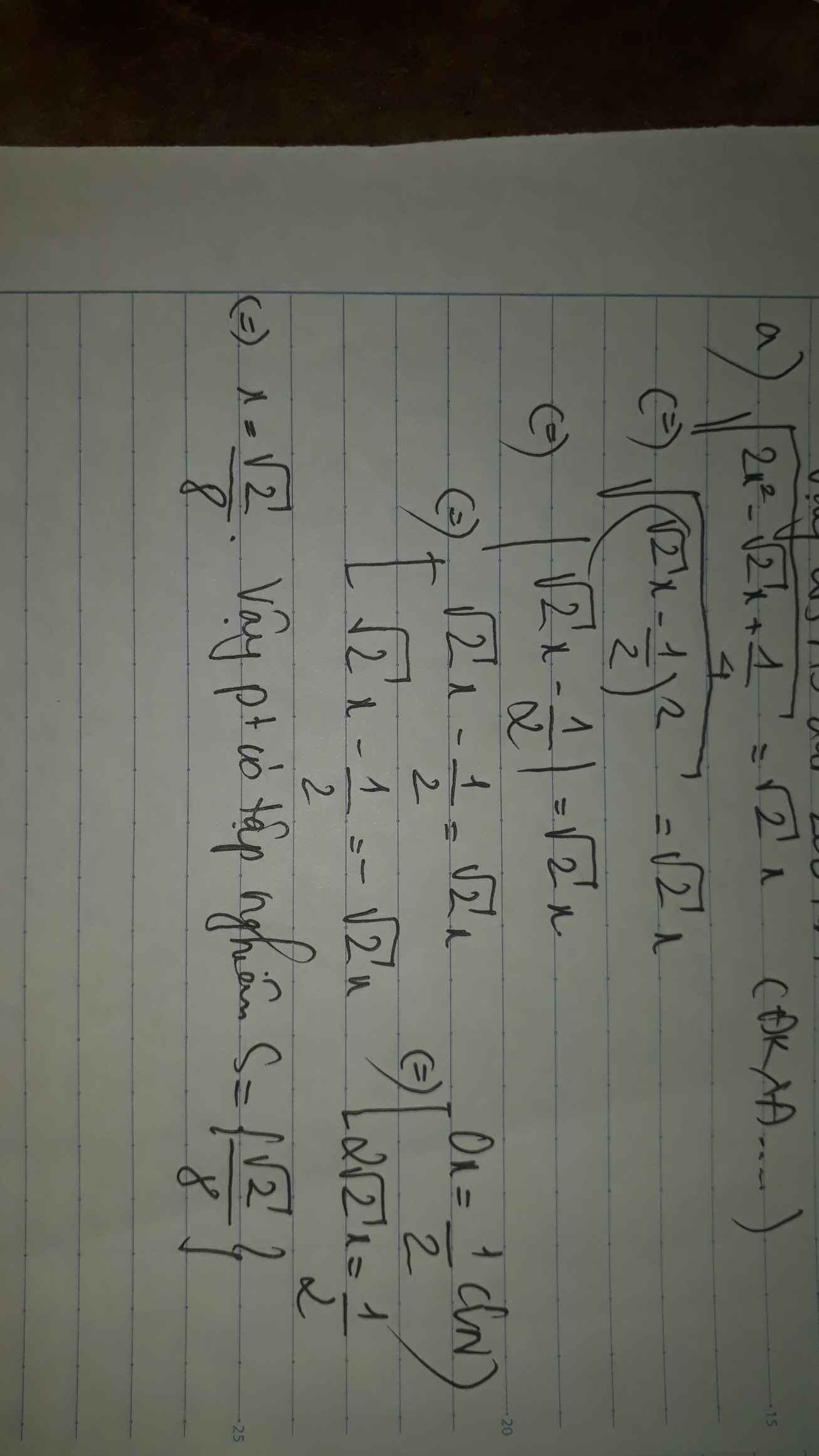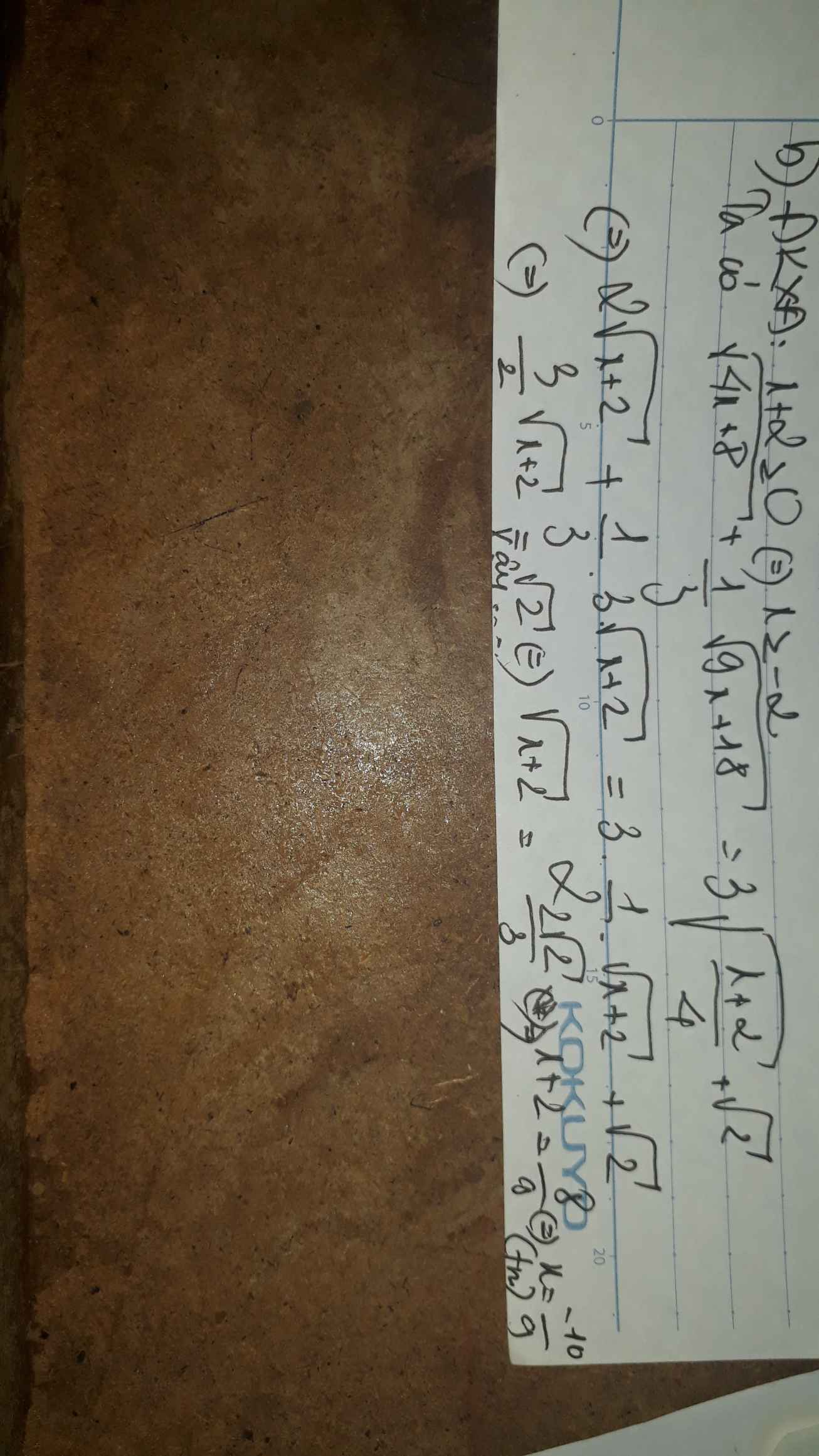giải phương trình: \(4\sqrt{x-2}+3\sqrt{4x-2}=3\)

Những câu hỏi liên quan
1. Giải phương trình: \(\sqrt{x-2}+\sqrt{4-x}=\sqrt{2}\) .
2. Giải phương trình: \(4x^4-7x^3+9x^2-10x+4=0\).
3. Giải hệ phương trình: \(\left\{{}\begin{matrix}x^2+y^2=3-xy\\x^4+y^4=2\end{matrix}\right.\) .
Bài 1: ĐKXĐ: $2\leq x\leq 4$
PT $\Leftrightarrow (\sqrt{x-2}+\sqrt{4-x})^2=2$
$\Leftrightarrow 2+2\sqrt{(x-2)(4-x)}=2$
$\Leftrightarrow (x-2)(4-x)=0$
$\Leftrightarrow x-2=0$ hoặc $4-x=0$
$\Leftrightarrow x=2$ hoặc $x=4$ (tm)
Đúng 2
Bình luận (0)
Bài 2:
PT $\Leftrightarrow 4x^3(x-1)-3x^2(x-1)+6x(x-1)-4(x-1)=0$
$\Leftrightarrow (x-1)(4x^3-3x^2+6x-4)=0$
$\Leftrightarrow x=1$ hoặc $4x^3-3x^2+6x-4=0$
Với $4x^3-3x^2+6x-4=0(*)$
Đặt $x=t+\frac{1}{4}$ thì pt $(*)$ trở thành:
$4t^3+\frac{21}{4}t-\frac{21}{8}=0$
Đặt $t=m-\frac{7}{16m}$ thì pt trở thành:
$4m^3-\frac{343}{1024m^3}-\frac{21}{8}=0$
$\Leftrightarrow 4096m^6-2688m^3-343=0$
Coi đây là pt bậc 2 ẩn $m^3$ và giải ta thu được \(m=\frac{\sqrt[3]{49}}{4}\) hoặc \(m=\frac{-\sqrt[3]{7}}{4}\)
Khi đó ta thu được \(x=\frac{1}{4}(1-\sqrt[3]{7}+\sqrt[3]{49})\)
Đúng 2
Bình luận (0)
Nãy mình tìm được một cách giải tương tự cho câu 2.
PT \(\Leftrightarrow\left(x-1\right)\left(4x^3-3x^2+6x-4\right)=0\)
\(\Leftrightarrow\left[{}\begin{matrix}x-1=0\\4x^3-3x^2+6x-4=0\left(1\right)\end{matrix}\right.\)
Vậy pt có 1 nghiệm bằng 1.
\(\left(1\right)\Rightarrow8x^3-6x^2+12x-8=0\)
\(\Leftrightarrow7x^3+x^3-6x^2+12x-8=0\)
\(\Leftrightarrow\left(x-2\right)^3=-7x^3\)
\(\Leftrightarrow x-2=-\sqrt[3]{7}x\)
\(\Leftrightarrow x=\dfrac{2}{1+\sqrt[3]{7}}\)
Vậy pt có nghiệm \(S=\left\{1;\dfrac{2}{1+\sqrt[3]{7}}\right\}\)
Lưu ý: Nghiệm của người kia hoàn toàn tương đồng với nghiệm của mình (\(\dfrac{2}{1+\sqrt[3]{7}}=\dfrac{1}{4}\left(1-\sqrt[3]{7}+\sqrt[3]{49}\right)\))
Đúng 0
Bình luận (0)
Xem thêm câu trả lời
a) Giải phương trình trên tập số thực:
\(x^3-4x^2-5x+6=\sqrt[3]{7x^2+9x-4}\)
b) Giải hệ phương trình sau:
\(\left\{{}\begin{matrix}x^2+2x\sqrt{xy}=y^2\sqrt{y}\\\left(4x^3+y^3+3x^2\sqrt{x}\right)\left(15\sqrt{x}+y\right)=3\sqrt{x}\left(y\sqrt{y}+x\sqrt{y}+4x\sqrt{x}\right)^2\end{matrix}\right.\) ; với \(x,y\inℝ\)
a) \(x^3-4x^2-5x+6=\sqrt[3]{7x^2+9x-4}\)
\(\Leftrightarrow-7x^2-9x+4+x^3+3x^2+4x+2=\sqrt[3]{7x^2+9x-4}\)
\(\Leftrightarrow-\left(7x^2+9x-4\right)+\left(x+1\right)^3+x+1=\sqrt[3]{7x^2+9x-4}\) (*)
Đặt \(\sqrt[3]{7x^2+9x-4}=a;x+1=b\)
Khi đó (*) \(\Leftrightarrow-a^3+b^3+b=a\)
\(\Leftrightarrow\left(b-a\right).\left(b^2+ab+a^2+1\right)=0\)
\(\Leftrightarrow b=a\)
Hay \(x+1=\sqrt[3]{7x^2+9x-4}\)
\(\Leftrightarrow\left(x+1\right)^3=7x^2+9x-4\)
\(\Leftrightarrow x^3-4x^2-6x+5=0\)
\(\Leftrightarrow x^3-4x^2-5x-x+5=0\)
\(\Leftrightarrow\left(x-5\right)\left(x^2+x-1\right)=0\)
\(\Leftrightarrow\left[{}\begin{matrix}x=5\\x=\dfrac{-1\pm\sqrt{5}}{2}\end{matrix}\right.\)
Đúng 1
Bình luận (0)
1.Giải phương trình:
\(\sqrt{x^2-4}-x^2+4=0\)
2.Giải phương trình:
\(\sqrt{x^2-4x+5}+\sqrt{x^2-4x+8}+\sqrt{x^2-4x+9}=3+\sqrt{5}\)
1. \(\sqrt{x^2-4}-x^2+4=0\)( ĐK: \(\orbr{\begin{cases}x\ge2\\x\le-2\end{cases}}\))
\(\Leftrightarrow\sqrt{x^2-4}=x^2-4\)
\(\Leftrightarrow\left(x^2-4\right)^2=x^2-4\)
\(\Leftrightarrow\left(x^2-4\right)^2-\left(x^2-4\right)=0\)
\(\Leftrightarrow\left(x^2-4\right)\left(x^2-4-1\right)=0\)
\(\Leftrightarrow\orbr{\begin{cases}x^2=4\\x^2=5\end{cases}}\)
\(\Leftrightarrow\orbr{\begin{cases}x=\pm2\left(tm\right)\\x=\pm\sqrt{5}\left(tm\right)\end{cases}}\)
Vậy pt có tập no \(S=\left\{2;-2;\sqrt{5};-\sqrt{5}\right\}\)
2. \(\sqrt{x^2-4x+5}+\sqrt{x^2-4x+8}+\sqrt{x^2-4x+9}=3+\sqrt{5}\)ĐK: \(\hept{\begin{cases}x^2-4x+5\ge0\\x^2-4x+8\ge0\\x^2-4x+9\ge0\end{cases}}\)
\(\Leftrightarrow\sqrt{x^2-4x+5}-1+\sqrt{x^2-4x+8}-2+\sqrt{x^2-4x+9}-\sqrt{5}=0\)
\(\Leftrightarrow\frac{x^2-4x+4}{\sqrt{x^2-4x+5}+1}+\frac{x^2-4x+4}{\sqrt{x^2-4x+8}+2}+\frac{x^2-4x+4}{\sqrt{x^2-4x+9}+\sqrt{5}}=0\)
\(\Leftrightarrow\left(x-2\right)^2\left(\frac{1}{\sqrt{x^2-4x+5}+1}+\frac{1}{\sqrt{x^2-4x+8}+2}+\frac{1}{\sqrt{x^2}-4x+9+\sqrt{5}}\right)=0\)
Từ Đk đề bài \(\Rightarrow\frac{1}{\sqrt{x^2-4x+5}+1}+\frac{1}{\sqrt{x^2-4x+8}+2}+\frac{1}{\sqrt{x^2}-4x+9+\sqrt{5}}>0\)
\(\Rightarrow\left(x-2\right)^2=0\)
\(\Leftrightarrow x=2\left(tm\right)\)
Vậy pt có no x=2
Giải phương trình
\(\sqrt{4x^2-4x+1}=3-x\)
\(\sqrt{9x+9}+\sqrt{x+1}-\sqrt{4x+4}=2\left(x+1\right)\)
\(\sqrt{4x^2-4x+1}=3-x\left(x\in R\right)\\ \Leftrightarrow\sqrt{\left(2x-1\right)^2}=3-x\\ \Leftrightarrow2x-1=3-x\\ \Leftrightarrow3x=4\Leftrightarrow x=\dfrac{4}{3}\\ \sqrt{9x+9}+\sqrt{x+1}-\sqrt{4x+4}=2\left(x+1\right)\left(x\ge-1\right)\\ \Leftrightarrow\sqrt{x+1}\left(\sqrt{9}+1+\sqrt{4}\right)=2\left(x+1\right)\\ \Leftrightarrow6\sqrt{x+1}=2\left(x+1\right)\\ \Leftrightarrow3\sqrt{x+1}=x+1\\ \Leftrightarrow\sqrt{x+1}\left(3-\sqrt{x+1}\right)=0\\ \Leftrightarrow\left[{}\begin{matrix}x+1=0\\\sqrt{x+1}=3\end{matrix}\right.\Leftrightarrow\left[{}\begin{matrix}x=-1\\x+1=9\end{matrix}\right.\Leftrightarrow\left[{}\begin{matrix}x=-1\left(tm\right)\\x=8\left(tm\right)\end{matrix}\right.\)
Đúng 2
Bình luận (0)
a, ĐK: \(x\in R\)
\(\sqrt{4x^2-4x+1}=3-x\)
\(\Leftrightarrow\sqrt{\left(2x-1\right)^2}=3-x\)
\(\Leftrightarrow\left|2x-1\right|=3-x\)
TH1: \(\left\{{}\begin{matrix}2x-1\ge0\\2x-1=3-x\end{matrix}\right.\Leftrightarrow\left\{{}\begin{matrix}x\ge\dfrac{1}{2}\\x=\dfrac{4}{3}\end{matrix}\right.\Leftrightarrow x=\dfrac{4}{3}\)
TH2: \(\left\{{}\begin{matrix}2x-1< 0\\1-2x=3-x\end{matrix}\right.\Leftrightarrow\left\{{}\begin{matrix}x< \dfrac{1}{2}\\x=-2\end{matrix}\right.\Leftrightarrow x=-2\)
Đúng 0
Bình luận (0)
b, ĐK: \(x\ge-1\)
\(\sqrt{9x+9}+\sqrt{x+1}-\sqrt{4x+4}=2\left(x+1\text{}\right)\)
\(\Leftrightarrow3\sqrt{x+1}+\sqrt{x+1}-2\sqrt{x+1}=2\left(x+1\right)\)
\(\Leftrightarrow\sqrt{x+1}=x+1\)
\(\Leftrightarrow\sqrt{x+1}\left(\sqrt{x+1}-1\right)=0\)
\(\Leftrightarrow\left[{}\begin{matrix}\sqrt{x+1}=0\\\sqrt{x+1}=1\end{matrix}\right.\)
\(\Leftrightarrow\left[{}\begin{matrix}x=-1\left(tm\right)\\x=0\left(tm\right)\end{matrix}\right.\)
Đúng 0
Bình luận (0)
Xem thêm câu trả lời
Giải phương trình:
\(\sqrt[3]{x+2}+\sqrt[3]{x^2+3x-5}=\sqrt[3]{x^2+4x-4}+1\)
Lời giải:
Đặt $\sqrt[3]{x^2+3x-5}=a; \sqrt[3]{x+2}=b$. Khi đó pt đã cho tương đương với:
$a+b=\sqrt[3]{a^3+b^3-1}+1$
$\Leftrightarrow a+b-1=\sqrt[3]{a^3+b^3-1}$
$\Leftrightarrow (a+b-1)^3=a^3+b^3-1$
$\Leftrightarrow (a+b)^3-3(a+b)^2+3(a+b)-1=a^3+b^3-1$
$\Leftrightarrow 3ab(a+b)-3(a+b)^2+3(a+b)=0$
$\Leftrightarrow ab(a+b)-(a+b)^2+(a+b)=0$
$\Leftrightarrow (a+b)(ab-a-b+1)=0$
$\Leftrightarrow (a+b)(a-1)(b-1)=0$
Nếu $a+b=0\Leftrightarrow \sqrt[3]{x^2+3x-5}=-\sqrt[3]{x+2}$
$\Leftrightarrow x^2+3x-5=-(x+2)$
$\Leftrightarrow x^2+4x-3=0$
$\Leftrightarrow x=-2\pm \sqrt{7}$
Nếu $a-1=0\Leftrightarrow \sqrt[3]{x^2+3x-5}=1$
$\Leftrightarrow x^2+3x-6=0$
$\Leftrightarrow x=\frac{-3\pm \sqrt{33}}{2}$
Nếu $b-1=0\Leftrightarrow \sqrt[3]{x+2}=1$
$\Leftrightarrow x=-1$
Đúng 0
Bình luận (0)
1) Giải hệ phương trìnhleft{{}begin{matrix}3x^2+xy-4x+2y2xleft(x+1right)+yleft(y+1right)4end{matrix}right.2) Giải phương trìnhsqrt{x^2-5x+4}+2sqrt{x+5}2sqrt{x-4}+sqrt{x^2+4x-5}3) Tính giá trị của biểu thứcA2x^3+3x^2-4x+2Với xsqrt{2+sqrt{dfrac{5+sqrt{5}}{2}}}+sqrt{2-sqrt{dfrac{5+sqrt{5}}{2}}}-sqrt{3-sqrt{5}}-14) Cho x, y thỏa mãn:sqrt{x+2014}+sqrt{2015-x}-sqrt{2014-x}sqrt{y+2014}+sqrt{2015-y}-sqrt{2014-y}Chứng minh xy
Đọc tiếp
1) Giải hệ phương trình
\(\left\{{}\begin{matrix}3x^2+xy-4x+2y=2\\x\left(x+1\right)+y\left(y+1\right)=4\end{matrix}\right.\)
2) Giải phương trình
\(\sqrt{x^2-5x+4}+2\sqrt{x+5}=2\sqrt{x-4}+\sqrt{x^2+4x-5}\)
3) Tính giá trị của biểu thức
\(A=2x^3+3x^2-4x+2\)
Với \(x=\sqrt{2+\sqrt{\dfrac{5+\sqrt{5}}{2}}}+\sqrt{2-\sqrt{\dfrac{5+\sqrt{5}}{2}}}-\sqrt{3-\sqrt{5}}-1\)
4) Cho x, y thỏa mãn:
\(\sqrt{x+2014}+\sqrt{2015-x}-\sqrt{2014-x}=\sqrt{y+2014}+\sqrt{2015-y}-\sqrt{2014-y}\)
Chứng minh \(x=y\)
Câu 4:
Giả sử điều cần chứng minh là đúng
\(\Rightarrow x=y\), thay vào điều kiện ở đề bài, ta được:
\(\sqrt{x+2014}+\sqrt{2015-x}-\sqrt{2014-x}=\sqrt{x+2014}+\sqrt{2015-x}-\sqrt{2014-x}\) (luôn đúng)
Vậy điều cần chứng minh là đúng
Đúng 7
Bình luận (3)
2) \(\sqrt{x^2-5x+4}+2\sqrt{x+5}=2\sqrt{x-4}+\sqrt{x^2+4x-5}\)
⇔ \(\sqrt{\left(x-4\right)\left(x-1\right)}-2\sqrt{x-4}+2\sqrt{x+5}-\sqrt{\left(x+5\right)\left(x-1\right)}=0\)
⇔ \(\sqrt{x-4}.\left(\sqrt{x-1}-2\right)-\sqrt{x+5}\left(\sqrt{x-1}-2\right)=0\)
⇔ \(\left(\sqrt{x-4}-\sqrt{x+5}\right)\left(\sqrt{x-1}-2\right)=0\)
⇔ \(\left[{}\begin{matrix}\sqrt{x-4}-\sqrt{x+5}=0\\\sqrt{x-1}-2=0\end{matrix}\right.\)
⇔ \(\left[{}\begin{matrix}\sqrt{x-4}=\sqrt{x+5}\\\sqrt{x-1}=2\end{matrix}\right.\)
⇔ \(\left[{}\begin{matrix}x\in\varnothing\\x=5\end{matrix}\right.\)
⇔ x = 5
Vậy S = {5}
Đúng 4
Bình luận (0)
Bài 1:
ĐKĐB suy ra $x(x+1)+y(y+1)=3x^2+xy-4x+2y+2$
$\Leftrightarrow 2x^2+x(y-5)+(y-y^2+2)=0$
Coi đây là PT bậc 2 ẩn $x$
$\Delta=(y-5)^2-4(y-y^2+2)=(3y-3)^2$Do đó:
$x=\frac{y+1}{2}$ hoặc $x=2-y$. Thay vào một trong 2 phương trình ban đầu ta thu được:
$(x,y)=(\frac{-4}{5}, \frac{-13}{5}); (1,1)$
Đúng 4
Bình luận (0)
Xem thêm câu trả lời
giải phương trình
1)\(\sqrt{9\left(x-1\right)}=21\)
2)\(\sqrt{1-x}+\sqrt{4-4x}-\dfrac{1}{3}\sqrt{16-16x}+5=0\)
3)\(\sqrt{2x}-\sqrt{50}=0\)
4)\(\sqrt{4x^2+4x+1}=6\)
5)\(\sqrt{\left(x-3\right)^2}=3-x\)
1) \(\sqrt[]{9\left(x-1\right)}=21\)
\(\Leftrightarrow9\left(x-1\right)=21^2\)
\(\Leftrightarrow9\left(x-1\right)=441\)
\(\Leftrightarrow x-1=49\Leftrightarrow x=50\)
2) \(\sqrt[]{1-x}+\sqrt[]{4-4x}-\dfrac{1}{3}\sqrt[]{16-16x}+5=0\)
\(\Leftrightarrow\sqrt[]{1-x}+\sqrt[]{4\left(1-x\right)}-\dfrac{1}{3}\sqrt[]{16\left(1-x\right)}+5=0\)
\(\)\(\Leftrightarrow\sqrt[]{1-x}+2\sqrt[]{1-x}-\dfrac{4}{3}\sqrt[]{1-x}+5=0\)
\(\Leftrightarrow\sqrt[]{1-x}\left(1+3-\dfrac{4}{3}\right)+5=0\)
\(\Leftrightarrow\sqrt[]{1-x}.\dfrac{8}{3}=-5\)
\(\Leftrightarrow\sqrt[]{1-x}=-\dfrac{15}{8}\)
mà \(\sqrt[]{1-x}\ge0\)
\(\Leftrightarrow pt.vô.nghiệm\)
3) \(\sqrt[]{2x}-\sqrt[]{50}=0\)
\(\Leftrightarrow\sqrt[]{2x}=\sqrt[]{50}\)
\(\Leftrightarrow2x=50\Leftrightarrow x=25\)
Đúng 2
Bình luận (0)
1) \(\sqrt{9\left(x-1\right)}=21\) (ĐK: \(x\ge1\))
\(\Leftrightarrow3\sqrt{x-1}=21\)
\(\Leftrightarrow\sqrt{x-1}=7\)
\(\Leftrightarrow x-1=49\)
\(\Leftrightarrow x=49+1\)
\(\Leftrightarrow x=50\left(tm\right)\)
2) \(\sqrt{1-x}+\sqrt{4-4x}-\dfrac{1}{3}\sqrt{16-16x}+5=0\) (ĐK: \(x\le1\))
\(\Leftrightarrow\sqrt{1-x}+2\sqrt{1-x}-\dfrac{4}{3}\sqrt{1-x}+5=0\)
\(\Leftrightarrow\dfrac{5}{3}\sqrt{1-x}+5=0\)
\(\Leftrightarrow\dfrac{5}{3}\sqrt{1-x}=-5\) (vô lý)
Phương trình vô nghiệm
3) \(\sqrt{2x}-\sqrt{50}=0\) (ĐK: \(x\ge0\))
\(\Leftrightarrow\sqrt{2x}=\sqrt{50}\)
\(\Leftrightarrow2x=50\)
\(\Leftrightarrow x=\dfrac{50}{2}\)
\(\Leftrightarrow x=25\left(tm\right)\)
4) \(\sqrt{4x^2+4x+1}=6\)
\(\Leftrightarrow\sqrt{\left(2x+1\right)^2}=6\)
\(\Leftrightarrow\left|2x+1\right|=6\)
\(\Leftrightarrow\left[{}\begin{matrix}2x+1=6\left(ĐK:x\ge-\dfrac{1}{2}\right)\\2x+1=-6\left(ĐK:x< -\dfrac{1}{2}\right)\end{matrix}\right.\)
\(\Leftrightarrow\left[{}\begin{matrix}2x=5\\2x=-7\end{matrix}\right.\)
\(\Leftrightarrow\left[{}\begin{matrix}x=\dfrac{5}{2}\left(tm\right)\\x=-\dfrac{7}{2}\left(tm\right)\end{matrix}\right.\)
5) \(\sqrt{\left(x-3\right)^2}=3-x\)
\(\Leftrightarrow\left|x-3\right|=3-x\)
\(\Leftrightarrow x-3=3-x\)
\(\Leftrightarrow x+x=3+3\)
\(\Leftrightarrow x=\dfrac{6}{2}\)
\(\Leftrightarrow x=3\)
Đúng 3
Bình luận (0)
1) => 9(x-1)=\(21^2\)
=> 9x-9=441
=> 9x=450
=> x=50
2)=>\(\sqrt{1-x}\) + \(\sqrt{4\left(1-x\right)}\)-\(\dfrac{1}{3}\sqrt{16\left(1-x\right)}\)+5=0
=>\(\sqrt{1-x}\)\(\left(1+2-\dfrac{1}{3}.4\right)\)+5=0
=>\(\dfrac{5}{3}\sqrt{1-x}\) +5=0
=>\(\sqrt{1-x}\)=-3
Phuong trinh vo nghiem
Đúng 0
Bình luận (0)
Xem thêm câu trả lời
Giải bất phương trình sau : a/ 2x ^ 2 + 6x - 8 < 0 x ^ 2 + 5x + 4 >=\ 2) Giải phương trình sau : a/ sqrt(2x ^ 2 - 4x - 2) = sqrt(x ^ 2 - x - 2) c/ sqrt(2x ^ 2 - 4x + 2) = sqrt(x ^ 2 - x - 3) b/ x ^ 2 + 5x + 4 < 0 d/ 2x ^ 2 + 6x - 8 > 0 b/ sqrt(- x ^ 2 - 5x + 2) = sqrt(x ^ 2 - 2x - 3) d/ sqrt(- x ^ 2 + 6x - 4) = sqrt(x ^ 2 - 2x - 7)
2:
a: =>2x^2-4x-2=x^2-x-2
=>x^2-3x=0
=>x=0(loại) hoặc x=3
b: =>(x+1)(x+4)<0
=>-4<x<-1
d: =>x^2-2x-7=-x^2+6x-4
=>2x^2-8x-3=0
=>\(x=\dfrac{4\pm\sqrt{22}}{2}\)
Đúng 0
Bình luận (0)
Giải phương trình
\(a.\dfrac{3}{4}\sqrt{4x}-\sqrt{4x}+5=\dfrac{1}{4}\sqrt{4x}\)
\(b.\sqrt{3-x}-\sqrt{27-9x}+1,25.\sqrt{48-16x}=6\)
\(c.\dfrac{5\sqrt{x}-2}{8\sqrt{x}+2,5}=\dfrac{2}{7}\)
\(d.\sqrt{9x^2+12x+4}=4\)
d. \(\sqrt{9x^2+12x+4}=4\)
<=> \(\sqrt{\left(3x+2\right)^2}=4\)
<=> \(|3x+2|=4\)
<=> \(\left[{}\begin{matrix}3x+2=4\\3x+2=-4\end{matrix}\right.\Leftrightarrow\left[{}\begin{matrix}3x=2\\3x=-6\end{matrix}\right.\Leftrightarrow\left[{}\begin{matrix}x=\dfrac{2}{3}\\x=-2\end{matrix}\right.\)
Đúng 0
Bình luận (0)
c: Ta có: \(\dfrac{5\sqrt{x}-2}{8\sqrt{x}+2.5}=\dfrac{2}{7}\)
\(\Leftrightarrow35\sqrt{x}-14=16\sqrt{x}+5\)
\(\Leftrightarrow x=1\)
Đúng 0
Bình luận (0)
Giải phương trình :
a) \(\sqrt{2x^2-\sqrt{2}x+\dfrac{1}{4}}=\sqrt{2}x\)
b)\(\sqrt{4x+8}+\dfrac{1}{3}\sqrt{9x+18}=3\sqrt{\dfrac{x+2}{4}}+\sqrt{2}\)
b: Ta có: \(\sqrt{4x+8}+\dfrac{1}{3}\sqrt{9x+18}=3\sqrt{\dfrac{x+2}{4}}+\sqrt{2}\)
\(\Leftrightarrow2\sqrt{x+2}+\dfrac{1}{3}\cdot3\sqrt{x+2}-\dfrac{3}{2}\sqrt{x+2}=\sqrt{2}\)
\(\Leftrightarrow\sqrt{x+2}\cdot\dfrac{3}{2}=\sqrt{2}\)
\(\Leftrightarrow\sqrt{x+2}=\dfrac{2\sqrt{2}}{3}\)
\(\Leftrightarrow x+2=\dfrac{8}{9}\)
hay \(x=-\dfrac{10}{9}\)
Đúng 0
Bình luận (0)
































